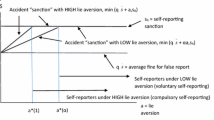Abstract
Self-reporting of compliance status has become a common feature in the enforcement of environmental regulation. In this paper, I generalize existing models of enforcement with self-reporting to include the possibility of private enforcement of regulation through citizen suits. This allows me to identify an additional argument for the efficiency of self-reporting: it can increase the likelihood of a successful suit and thus facilitate private enforcement of regulation. Specifically, if self-reporting sufficiently increases the expected penalty for losing a citizen suit, if the costs of private enforcement are low, and if inspection costs are high enough relative to enforcement costs, self-reporting lowers expected regulatory and social costs by allowing the regulator to rely on private enforcement and decrease his enforcement efforts.
Similar content being viewed by others
Abbreviations
- EPA:
-
Environmental Protection Agency
- SR:
-
Self-reporting
References
Adler JH (2001). Stand or deliver: citizen suits, standing and environmental protection. Duke Environ Law Policy Forum 12: 39–83
Baik KH and Shogren JF (1994). Environmental conflicts with reimbursement for citizen suits. J Environ Econ Manage 27: 1–20
Bester H and Strauz R (2000). Imperfect commitment and the revelation principle: the multi-agent case. Econ Lett 69: 165–171
Fadil A (1985). Citizen suits against polluters: picking up the pace. Harvard Environ Law Rev 9: 23–84
Grossman SJ and Hart OD (1983). An analysis of the principal-agent problem. Econometrica 51: 7–45
Harford J (1987). Self-reporting of pollution and the firm’s behavior under imperfectly enforceable regulations. J Environ Econ Manage 14: 293–303
Harrington W (1988). Enforcement leverage when penalties are restricted. J Public Econ 37: 29–53
Heyes AG (1997). Environmental regulation by private contest. J Public Econ 63: 407–428
Heyes AG and Rickman N (1999). Regulatory dealing—revisiting the Harrington Paradox. J Public Econ 72: 361–378
Hurley TM and Shogren JF (1997). Environmental conflicts and the SLAPP. J Environ Econ Manage 33: 253–273
Innes R (1999). Remediation and self-reporting in optimal law enforcement. J Public Econ 72: 379–393
Innes R (2000). Self-reporting in optimal law enforcement when violators have heterogeneous probabilities of apprehension. J Legal Stud 24: 287–300
Innes R (2001). Violator avoidance activities and self-reporting in optimal law enforcement. J Law Econ Organ 17: 239–256
Kaplow L (1986). Private versus social costs in bringing suit. J Legal Stud 15: 371–386
Kaplow L and Shavell S (1994). Optimal law enforcement with self-reporting of behavior. J Polit Econ 102: 583–606
Langpap C (2007). Pollution abatement with limited enforcement power and citizen suits. J Regul Econ 31: 57–81
Livernois J and McKenna CJ (1999). Truth or consequences. Enforcing pollution standards with self-reporting. J Public Econ 71: 415–440
Macfarlane R and Terry L (1997). Citizen suits: impacts on permitting and agency enforcement. Nat Resour Environ 11: 20–25
Malik AS (1993). Self-reporting and the design of policies for regulating stochastic pollution. J Environ Econ Manage 24: 241–257
Mookherjee D and Png IPL (1994). Marginal deterrence in enforcement of law. J Polit Econ 102: 1039–1066
Montero JP (2002). Prices versus quantities with incomplete enforcement. J Public Econ 85: 435–454
Myerson R (1979). Incentive compatibility and the bargaining problem. Econometrica 47: 61–73
Naysnerski W and Tietenberg T (1992). Private enforcement of federal environmental law. Land Econ 68: 28–48
Russell CS (1990) Monitoring and enforcement. In: Portney P (ed) Public policies for environmental protection. Resources for the Future
Settle C, Hurley TM, Shogren JF (2001) Citizen suits. In: Heyes AG (ed) The law and economics of the environment. Edward Elgar
Shavell S (1982). Suit, settlement and trial: a theoretical analysis under alternative methods for the allocation of legal costs. J Legal Stud 11: 55–81
Shavell S (1997). The fundamental divergence between the private and the social motive to use the legal system. J Legal Stud 26: 575–612
Swierzbinski J (1994). Guilty until proven innocent: regulation with costly and limited enforcement. J Environ Econ Manage 27: 127–146
U.S. Environmental Protection Agency, EPA’s Audit Policy, http://www.epa.gov/compliance/incentives/auditing/auditpolicy.html visited October 6, 2003
Author information
Authors and Affiliations
Corresponding author
Rights and permissions
About this article
Cite this article
Langpap, C. Self-Reporting and Private Enforcement in Environmental Regulation. Environ Resource Econ 40, 489–506 (2008). https://doi.org/10.1007/s10640-007-9166-8
Received:
Accepted:
Published:
Issue Date:
DOI: https://doi.org/10.1007/s10640-007-9166-8
Keywords
- Citizen suits
- Private enforcement
- Compliance
- Enforcement
- Environmental regulation
- Pollution control
- Self-reporting




